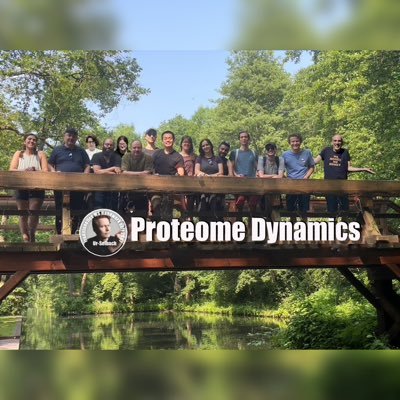
Selbach Lab
@SelbachLab
Followers
706
Following
125
Media
26
Statuses
120
Real flying ion Circus studying the proteome and its dynamics @BIMSB_MDC @MDC_Berlin
Berlin, Deutschland
Joined May 2017
MEK inhibition + growth factor → unexpected JNK activation 💥 Dual inhibition = significantly impaired tumor cell growth 🔬 SPIED-DIA = a powerful tool to dissect signaling & resistance #phosphoproteomics #cancerresearch #SPIED_DIA #MEKinhibition #DIA #precisionmedicine
0
0
2
We present SPIED-DIA – a spike-in enhanced phosphoproteomics method combining DIA with targeted sensitivity to uncover synergistic signaling in colorectal cancer cells. 👉 [ https://t.co/R4nL8acLu8](https://t.co/R4nL8acLu8)
1
4
13
What happens to all those alternative transcripts? 👉 Many are translated 👉 Proteolytic processing adds even more diversity Integrated mRNA & protein isoform landscape now out on bioRxiv! https://t.co/AazRU6WXgl
#proteomics #transcriptomics #systemsbiology
biorxiv.org
Alternative splicing and proteolytic processing expand the functional diversity of the human proteome by generating distinct protein isoforms from a single gene. However, the extent to which transc...
2
5
17
Excited to share our new paper in MCP! 🎉 DIA with Spike-In SILAC (DIA-SiS) boosts proteome coverage and quantification. Check it out: https://t.co/cKBh5FjlgE
#Proteomics #MassSpec #Research
1
1
12
Read our latest preprint on targeted phosphoproteomics: "Spike-in enhanced phosphoproteomics uncovers synergistic signaling responses to MEK inhibition in colon cancer cells.": https://t.co/UdzO3X4XQt
#Phosphoproteomics #DIA #CancerResearch #Signaling #ColonCancer
0
4
12
Combining data independent acquisition with spike-in SILAC (DIA-SiS) improves proteome coverage and quantification. Read our new preprint on bioRxiv. #SILAC
#DIA
#Proteomics
https://t.co/DCNP2uE1Mr
biorxiv.org
Data Independent Acquisition (DIA) is increasingly preferred over Data Dependent Acquisition (DDA) due to its higher throughput and fewer missing values. Whereas DDA often utilizes stable isotope...
0
6
28
Read our latest work on how phosphorylation in Intrinsically Disordered Regions (IDRs) affects protein-protein interactions in Nature Communications. @TRrustemi
https://t.co/qyZ54OJ5Bd
#IDR
#phosphorylation
nature.com
Nature Communications - Here the authors characterise the impact of phosphorylation site mutations in intrinsically disordered regions (IDRs) on protein-protein interactions, highlighting the...
0
23
90
We would like to congratulate Fabian @CosciaLab for being awarded the European Research Council (ERC) Starting Grant 👏. #ERC
https://t.co/FLqlMHzTDs
mdc-berlin.de
Whether aggressive cancer cells can spread unchecked depends, to no small degree, on their cellular neighborhood. Fabian Coscia wants to analyze exactly what happens at the proteome level during this...
0
0
20
Our latest preprint investigates the pathogenic mutations of human phosphorylation sites that affect protein-protein interactions. Using peptide-based interaction proteomics, more insights regarding the transcription factor GATAD1 were unveiled. @TRrustemi
biorxiv.org
Despite their lack of a defined 3D structure, intrinsically disordered regions (IDRs) of proteins play important biological roles. Many IDRs contain short linear motifs (SLiMs) that mediate protein...
0
7
36
We completed a 5x5 km team relay yesterday. Some of us already look forward to running again next year.
0
1
23
Interested in joining our Proteome Dynamics lab in Berlin? We are offering a postdoc position:
0
7
16
Looking for a method to identify drug targets? Our new paper on drug target identification by quantitative proteomics is now online:
chemistry-europe.onlinelibrary.wiley.com
Parallel identification: We present a new compound interaction screen on a cellulose membrane (CISCM) that combines undirected photoimmobilization of compounds on cellulose with affinity purificati...
0
4
11
3
14
161
How can you predict kinase activity in phosphoproteomic data? This database allows you to do this, even for poorly annotated kinases. Read more in this new paper: https://t.co/93O0Wnlcyu”
0
6
34
Given the energy required for protein synthesis, degrading proteins seems to be wasteful. Read about the physiological functions of protein degradation in this new review:
annualreviews.org
While cellular proteins were initially thought to be stable, research over the last decades has firmly established that intracellular protein degradation is an active and highly regulated process:...
1
21
72





